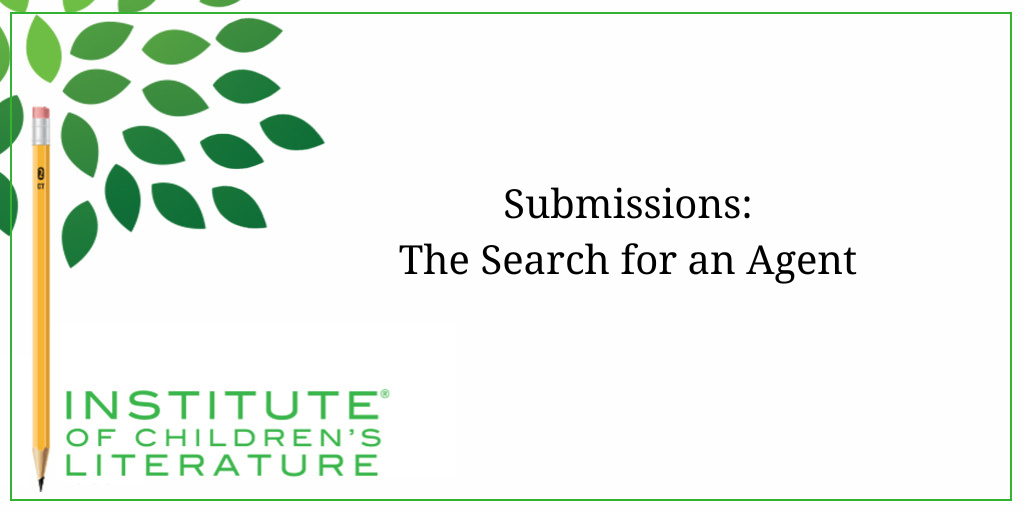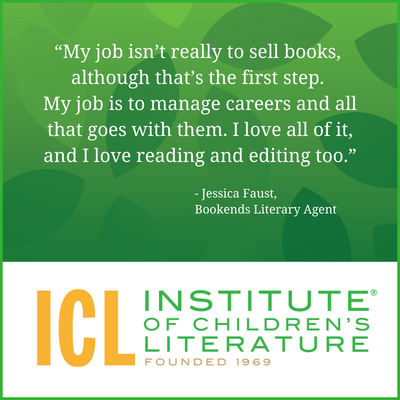
Your Voice or Theirs?
Voice, whether your natural writing voice or the voice of a character, comes from an emotional place. Jan Fields gives us exercises to develop these voices.

Many writers for children and young adults, particularly newer writers, are confused about agents. Do I need an agent? What do they do? How do you get one? Are they expensive? All these questions can leave writers open to being taken advantage of since not everyone calling themselves an agent is actually going to do a good job for you and for your manuscripts. So let’s talk a little about agents.

Agents are often skilled editors, though not every agent offers editorial advice at all. Some only represent books and writers they feel are already ready to sell, so don’t expect editorial advice from every agent you consider. This is one of the many things you need to discuss with an agent before signing with them.
Agents (good agents anyway) aren’t paid by you directly. Instead, an agent’s pay comes as a result of making the best possible deal for you, and the agent earns a commission for negotiating that deal. Agent rates do vary a bit, but the most common rate by far is 15%. So when a publisher makes an offer on your book, 15% of the money in that offer will go to your agent. This can sound a little painful, but since agents often have access to closed houses with deeper pockets, it may be 15% of a total far higher than you would have been able to get on your own.
There was a time when I told children’s writers that they almost certainly did not need an agent. Even today, you can get a book deal without an agent. You can meet editors at closed houses by attending workshops and conferences, and those meetings often result in a brief open window for submissions. There are also publishers who have open submissions, either all the time or during specific submission windows. And some areas of publishing (such as educational publishing) rarely involve agents at all. So you can have a full career without an agent. I do not presently have an agent, and I make a decent (though far from affluent) career from my writing. Still, my experience isn’t everyone’s experience.

Also, agents take a great deal of the submissions load off your shoulders, and that’s nothing to sneeze at all by itself. But there is something to keep in mind: agents depend heavily on their contacts when submitting novels so an agent who has solid experience working with a reputable agency and working their way up is going to have more contacts than a writer who simply decided to hang out an agency shingle. Another contact-rich option is an agent who worked as an acquiring editor for a variety of publishers before becoming an agent. People like that will have connections that speed up the submission process. Publishers trust these people and their tastes so they are more eager to receive submissions from them.
Some people want an agent because they want a lot of editing help, and some agents are very good at making editorial suggestions. But no agent will consider writers who seem too early in their career, meaning writers who have huge problems in their manuscripts such as multitudes of typos, poor narrative writing skills, poor dialogue skills, or poor plotting skills. Agents won’t get paid until they sell the manuscript, so they aren’t usually interested in teaming up with a writer who is going to take a long time to get ready for submissions. You really need to be ready to be published to be ready to be agented.
In fact, your manuscript should have already gone through a critiquing and revising process before submitting it to an agent. You want your story to be as polished as possible before they see it for the first time. If you’re writing picture books, you should have 3-4 polished manuscripts before submitting to an agent because if they like the first manuscript you submit, they will ask to see more work to ensure they can represent your whole career and that you can consistently produce publishable work.
Not every writer wants an agent. An agent can be one more voice speaking into the writing process, and for some writers, that adds confusion and makes it harder to stay true to their voice or their personal goals. Equally, some agents aren’t exactly transparent about the submissions process so writers represented by them may not know who is seeing their manuscript or what the responses are. This can be frustrating when it feels as if you’ve tossed your manuscript into a dark hole and you don’t know what, if anything, is happening to it. This is probably one of the greatest of the agent/author frustrations: communication.

I had an agent for a while who sent me all the rejections he received for my manuscript, word-for-word. Those rejections were enlightening (but may be emotionally hard on you if you’re not REALLY, REALLY thick-skinned.) If you feel you really wouldn’t respond well to blunt criticism of the work, you may want to specify that you want to know who is seeing it and how they respond in terms of anything positive they may have said even when they reject it, but you don’t need the full rejection letter text. Even the roughest criticism I received from the book my agent was shopping around included some positive remarks. Editors aren’t evil, but they can be blunt when they think you’ll never see what they said.
A bad agent is worse than no agent. And some agents can give you a bad experience even when they are a skilled, professional agent. An agent who is so overwhelmed with writers that manuscripts sit for a long time between submissions is going to be frustrating. An agent who asks you for money directly is going to have less motivation to find the best home for your manuscript, so isn’t a good choice (and is actually going against best practices for agents). An agent who makes you feel demoralized is not a good match for you.
Take your time and make the agent match that feels right. Resist the urge to be blinded by the euphoria of having an agent, any agent, show interest in your work.
Agents do a few very important things: they submit your manuscript to publishers that are likely to be a good match. They generally know inside information about what is going on at publishing houses and what specific publishers/editors are looking for. They know how to present your work well. They know exactly what you need to do to help the process and advise you accordingly.
When an offer is made, they know how to negotiate to get you the best possible deal. They negotiate deals for sub-rights, when and if they come up (such as international sales or movie rights). They offer advice. Good advice is worth nearly as much as all the other parts of the process. A good agent can help you maximize your writing time by encouraging you toward success.
An agent will also read royalty statements to ensure you’re receiving everything agreed to in your contract with the publisher.
And for all these excellent things, the agent earns a percentage of what you make on the project. Normally money from the publisher goes directly to the agent who receives their 15% commission and then sends you the rest. The agent never bills you.
The Internet is a massive boon to finding agents. You can find lists of agents all over. Writing blogs frequently interview agents and ask questions about their process, their agency, and their wish lists. Agents post often on Twitter. The Writer’s Digest Children’s Bookshelf newsletter lists publishing deals at the end of the newsletter, and these deals will list the names of the agents, which you can then take to Google to begin your research.

Look at who they represent (most are proud of the authors they represent). Look at the deals they’ve made (again, you may even have seen one of these deals in the PW Children’s Bookshelf newsletter.) If the agent is new, look at their previous experience and ask, did this lead them to have solid contacts in the publishing world? Read their tweets and read through the agency website and the agent’s personal website. Research agents through a market guide. Know as much as you can before you submit. By submitting only to agents you think you’d like to work with, you’ll be far less likely to sign with the wrong agent during that “someone wants me” euphoria.
Having an agent can be terrific. It can also be challenging and frustrating and sometimes disappointing. But it is a normal part of the publishing process. So, research, choose carefully, and know I’m rooting for your success. Always.
With over 100 books in publication, Jan Fields writes both chapter books for children and mystery novels for adults. She’s also known for a variety of experiences teaching writing, from one session SCBWI events to lengthier Highlights Foundation workshops to these blog posts for the Institute of Children’s Literature. As a former ICL instructor, Jan enjoys equipping writers for success in whatever way she can.

Voice, whether your natural writing voice or the voice of a character, comes from an emotional place. Jan Fields gives us exercises to develop these voices.

Voice is something publishers want, but it’s an elusive thing to understand. Today, we discover ways to develop our own voice and the voices of our characters.

When writing conflict, inner and outer conflicts are not two separate things. Outer conflicts offer an opportunity to explore inner ones better. Find out how.
1000 N. West Street #1200, Wilmington, DE 19801
© 2024 Direct Learning Systems, Inc. All rights reserved.
1000 N. West Street #1200, Wilmington, DE 19801
© 2024 Direct Learning Systems, Inc. All rights reserved.
1000 N. West Street #1200, Wilmington, DE 19801
© 2024 Direct Learning Systems, Inc. All rights reserved.
1 Comment